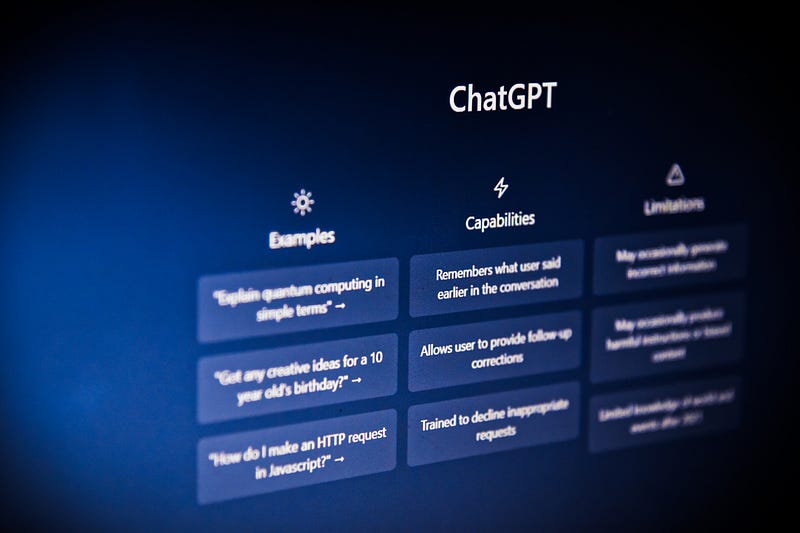Navigating the ChatGPT Debate: Insights and Implications
Written on
Chapter 1: Understanding ChatGPT
The emergence of ChatGPT, an AI-powered chatbot, has sparked intense discussions and raised significant concerns, particularly within educational circles.

When asked in Romanian about its purpose, ChatGPT stated, “it is a language model developed by OpenAI, designed to generate natural language text for a variety of applications.” OpenAI is also reportedly developing a tool to identify texts that may have been generated by AI.
This technology can produce a wide array of content, including essays, poetry in specific styles, personalized messages, marketing copy, social media posts, emails, and even programming code.
Who Developed ChatGPT?
OpenAI, based in San Francisco, is at the forefront of AI research. Founded in 2015 by tech investors like Elon Musk, the organization started with a budget of $1 billion, which was later doubled by a Microsoft investment in 2019. The launch of ChatGPT has attracted further investments in AI development, with Microsoft planning an additional $10 billion investment in the coming years.
Concerns from Educators
Teachers have emerged as some of ChatGPT's most vocal critics. The chatbot has been trained on vast amounts of text, enabling it to replicate human writing styles. Its creators assert that it will continue to improve and expand its knowledge base, making it nearly indistinguishable from human-written content.
Consequently, New York public schools have banned the use of ChatGPT on their devices due to fears about its potential impact on education. The Los Angeles Unified School District has made similar decisions, citing concerns about plagiarism and academic dishonesty.
Limitations of ChatGPT
Critics argue that while ChatGPT can offer quick answers, it lacks critical thinking and problem-solving skills—essential attributes for academic and lifelong success. Jenna Lyle, a spokesperson for New York Public Schools, emphasized the need for students to develop these skills rather than relying solely on AI.
In response to educators' worries, OpenAI has expressed a commitment to preventing misuse of the application in academic settings. The organization is working on tools to help identify AI-generated content and is eager to collaborate with teachers to find beneficial applications of AI in education.
Educators' Perspectives on AI
Kevin Roose, a technology columnist for The New York Times, recently spoke to New York City educators about adapting to AI in education. He noted their primary concern was the potential for students to cheat using AI tools like ChatGPT, as well as the possibility of receiving inaccurate or incomplete information from the application.
Roose also highlighted an existential question raised by educators: “Am I still needed?” after a teacher discovered that ChatGPT provided insightful feedback on student work.
The rapid emergence of such a capable tool has understandably left educators feeling threatened. However, Roose argues that instead of banning ChatGPT, teachers should integrate it as a resource to enhance creativity and learning.
Embracing Change in Education
Lalitha Vasudevan, an associate dean at Columbia University’s Teachers College, advocates for viewing ChatGPT as a new educational tool rather than a threat. She suggests that if certain traditional teaching methods can be automated, it may be time to reassess educational objectives and experiences.
Vasudevan compares ChatGPT to past innovations like calculators, which were initially resisted but are now integral to education. She believes the chatbot can be incorporated into lesson plans, offering a comparative analysis of writing styles and fostering critical thinking.
“These are complex decisions that schools face, and they should be made not out of fear, but to enhance learning,” Vasudevan stated.
OpenAI's Efforts to Address Concerns
OpenAI is actively developing a tool to detect AI-generated text to address concerns about academic dishonesty. The initial version, known as the “AI Text Classifier,” can analyze texts of up to 1,000 characters to assess the likelihood of AI authorship. The developers have acknowledged that the tool is not perfect and will continue to evolve based on user feedback.
Evaluating ChatGPT's Performance in Education
Professors at the University of Minnesota Law School tested ChatGPT's capabilities on exam questions, where it performed commendably but also made notable errors. The purpose of these tests was to explore ChatGPT's potential utility for lawyers and students, despite its current prohibition.
Similarly, a professor from the Wharton School evaluated ChatGPT’s performance on operations management tasks, finding it remarkably effective in many areas but still prone to mistakes in basic calculations.
Chapter 2: Addressing the AI Challenge
In the first video, "Who's Afraid of ChatGPT? | Heike Mersmann-Hoffmann | TEDxMünster," the speaker delves into the implications of AI on education and society.
The second video, "In The Public Square with John Nery: Who's Afraid of ChatGPT? Fear and trembling over AI," further explores the anxieties surrounding AI's role in education and the future.